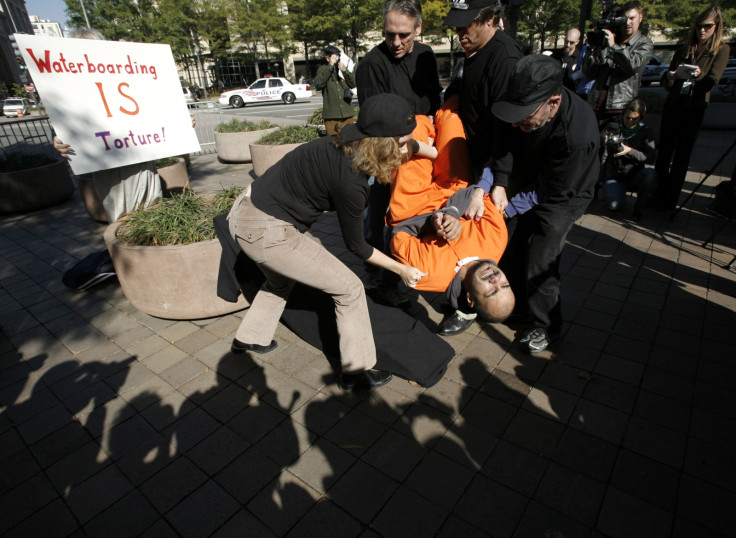CIA report: Why torture is ineffective with ideologically-motivated terrorists

The long-awaited "CIA torture report" that the US Senate Intelligence Committee is set to unveil to the public eye will once again put at the centre of political discussion the effectiveness of so-called Enhanced Interrogation Techniques (EIT) - which critics say are torture.
The committee's conclusion, which will be revealed in the 480-page executive summary, alleges that harsh interrogations have failed to produce a single piece of life-saving intelligence information that could not have been meted out with non-coercive means.
That statement is still strongly disputed by intelligence officials who claim that EIT has led to major breakthroughs.
Among the well-known waterboarding and sleep deprivation techniques, the report documents cases in which CIA interrogators threatened one or more detainees with mock executions. In some incidents, extremes measures were used, such as with Abu Zubaydah, a Palestinian who allegedly served as a travel agent for the al-Qaeda core organisation led by Osama bin Laden. Zubaydah was kept awake and interrogated for five days.
Although Barack Obama banned EIT during his first mandate, citing the "harm that was done to our national values", hardline intelligence officials argue that they were key in the fight against al-Qaeda.
Even George W Bush, who as president authorised the CIA's Rendition Detention and Interrogation program but later backtracked on its toughest aspects, called the CIA operatives who took part in torture "patriots".
"We're fortunate to have men and women who work hard at the CIA serving on our behalf," he told CNN. "These are patriots and whatever the report says, if it diminishes their contributions to our country, it is way off base."
The man who predicted 9/11
One notable exception to the principles of EIT is former FBI agent Ali Soufan, also known as the guy who nearly foiled the 9/11 plot.
Appointed at 29 to be the chief agent in charge of investigating the 2000 attack of the USS Cole in the harbour of Aden, Yemen, Soufan found out that al-Qaeda - then still a mysterious terrorist organisation - was behind the attack. He asked the CIA for information of a meeting in Malaysia, where at least two of the future 9/11 hijackers and the mastermind behind the Cole bombing had a secret rendez-vous. But the CIA teetered, and Soufan only received the intelligence on 12 September 2011.
In the post-9/11 world, Soufan distinguished himself for his witty interrogation techniques.
Thanks to an academic knowledge of the Quran, Soufan engaged in theological conversations with suspects, winning their respect. He manipulated terrorists, catching them by surprise.
"When I first began interrogating al-Qaeda members, I found that while they could quote bin Laden's sayings by heart, I knew far more of the Quran than they did - and in fact some barely knew classical Arabic, the language of both the Hadith and the Quran," he recalls in his book The Black Banners: The Inside Story of 9/11 and the War Against al-Qaeda.
'Knowledge' is the weapon against al-Qaeda
The agent's secret weapon against terrorist was a non-conventional one: knowledge. Outwitting suspects, rather than forcing them into submission, was key to extort crucial information. His methods were very different from the "extreme measures" meted out by contractors outside the government.
In his book, Soufan details how the CIA used a psychologist on Zubaydah for an "innovative" course of interrogations. With no previous experience or knowledge on Islamic extremism, the contractor worked out EIT measures to force the suspect into submission and "seeing him as a God".
But Soufan warned him that torture doesn't work with ideologically motivated terrorists. Waterboarding, sexual humiliation, deprivation of sleep, loud music - those are all extreme measures that terrorists are trained for years to resist.
"These things won't work on people committed to dying for their cause. People like Abu Zubaydah are prepared to blow themselves up and die," he wrote. "Don't you realise that if you try to humiliate him, you're just reinforcing what he expects us to do and what he's trained to resist?"
"Terrorists are trained to resist torture," he continued. "Being attacked by dogs, being sodomised and having family members raped in front of them are some of the things they are physically and mentally prepared to endure."
Trained for torture
Not only are these techniques ineffective, they can also serve to strengthen the terrorists' will, giving them a greater sense of control and expectation about their fate. It only reinforces their resistance and sense of a higher mission to accomplish.
Also, confessions obtained under torture are often misleading, as the victim tends to say what the interrogator wants to hear to alleviate the pain. "Evidence gained from torture is unreliable," he maintains. "There is no way to know whether the detainee is being truthful."
"Our greatest successes against al-Qaeda have come when we understood how they recruited, brainwashed and operated, and used our knowledge to outwit and defeat them. Our failures have come when we instead let ourselves be guided by ignorance, fear and brutality."
Soufan testified before the Senate Judiciary Committee and under oath recounting what happened with the post 9/11 interrogations. His book was heavily redacted by the CIA, despite having obtained the green light from the FBI.
The redactions - which are a violation of the classification guidelines which should protect the public from agencies trying to censor embarrassment and cover up mistakes - concern key moments such as what happened with the harsh techniques and the events leading to 9/11, but also trivial bits such as a public exchange between Soufan and the US senator Lindsey Graham, broadcast live on national television.
© Copyright IBTimes 2025. All rights reserved.





















